Salesforce developers are at the heart of customizing and deploying powerful CRM solutions. They bridge the gap between business needs and technology, ensuring that organizations can leverage Salesforce to its fullest potential.
Key skills for a Salesforce developer include proficiency in Apex and Visualforce, understanding of Salesforce's declarative capabilities, and abilities in problem-solving and effective communication.
Candidates can write these abilities in their resumes, but you can’t verify them without on-the-job Salesforce Developer skill tests.
In this post, we will explore 8 essential Salesforce Developer skills, 9 secondary skills and how to assess them so you can make informed hiring decisions.
Table of contents
8 fundamental Salesforce Developer skills and traits
The best skills for Salesforce Developers include Apex Programming, Visualforce Pages, Lightning Components, SOQL/SOSL, Salesforce APIs, Data Modeling, Process Automation and Security Practices.
Let’s dive into the details by examining the 8 essential skills of a Salesforce Developer.
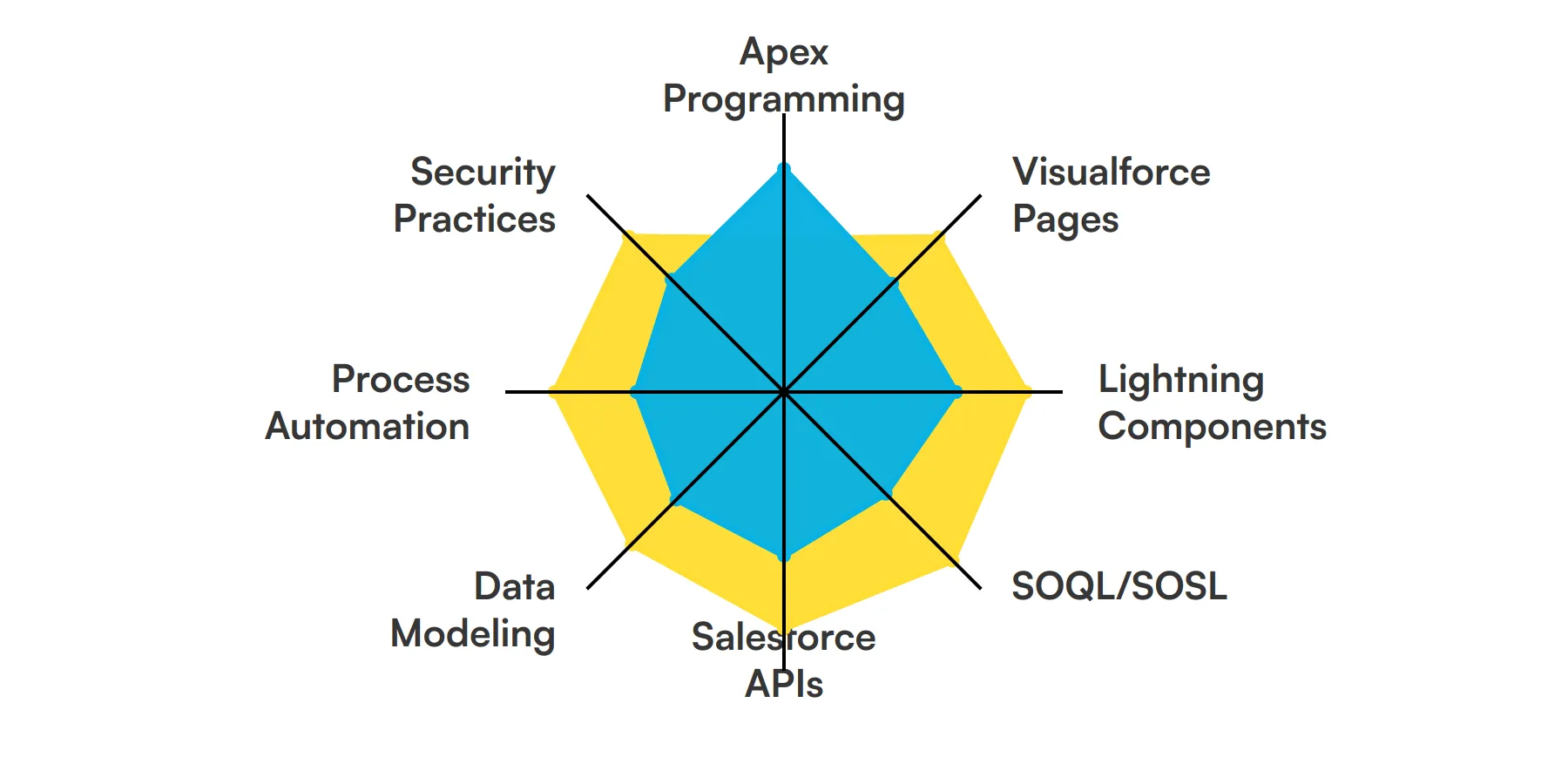
Apex Programming
Apex is Salesforce's proprietary programming language, resembling Java in syntax. A Salesforce Developer uses Apex to write custom business logic and integrations within the Salesforce platform. Mastery of Apex enables developers to create robust data models and business processes.
For more insights, check out our guide to writing a Salesforce Developer Job Description.
Visualforce Pages
Visualforce is a framework that allows developers to build custom user interfaces integrated with the Salesforce backend. It is essential for Salesforce Developers to create tailored UIs that enhance user experience and meet specific business requirements.
Lightning Components
Salesforce Lightning is a component-based framework for app development from Salesforce.com that is designed to simplify processes for business users, who typically do not have programming experience. Understanding Lightning Components is crucial for developers to build responsive applications for Salesforce environments.
Check out our guide for a comprehensive list of interview questions.
SOQL/SOSL
Salesforce Object Query Language (SOQL) and Salesforce Object Search Language (SOSL) are query languages used to search your organization’s Salesforce data. Salesforce Developers need to be proficient in these to efficiently retrieve, manipulate, and maintain data.
Salesforce APIs
APIs allow for integration between Salesforce and other systems. A Salesforce Developer must be skilled in using Salesforce APIs for data integration, which is critical for creating seamless user experiences and extending the platform's capabilities.
Data Modeling
Data modeling involves defining data elements and their relationships. Salesforce Developers use this skill to design and implement a database schema that effectively supports and enhances business processes within Salesforce.
For more insights, check out our guide to writing a Data Modeler Job Description.
Process Automation
Automating business processes is a key responsibility for Salesforce Developers. They use tools like Process Builder and Flow to automate workflows, which increases efficiency and reduces the potential for human error.
Security Practices
Understanding and implementing Salesforce security features such as sharing rules, profiles, and field-level security is essential. Salesforce Developers must ensure that data access is securely controlled and compliant with various regulatory requirements.
Check out our guide for a comprehensive list of interview questions.
9 secondary Salesforce Developer skills and traits
The best skills for Salesforce Developers include JavaScript, HTML/CSS, Git Version Control, Agile Methodologies, Testing and Debugging, Deployment Strategies, User Training, Documentation Skills and Analytical Skills.
Let’s dive into the details by examining the 9 secondary skills of a Salesforce Developer.
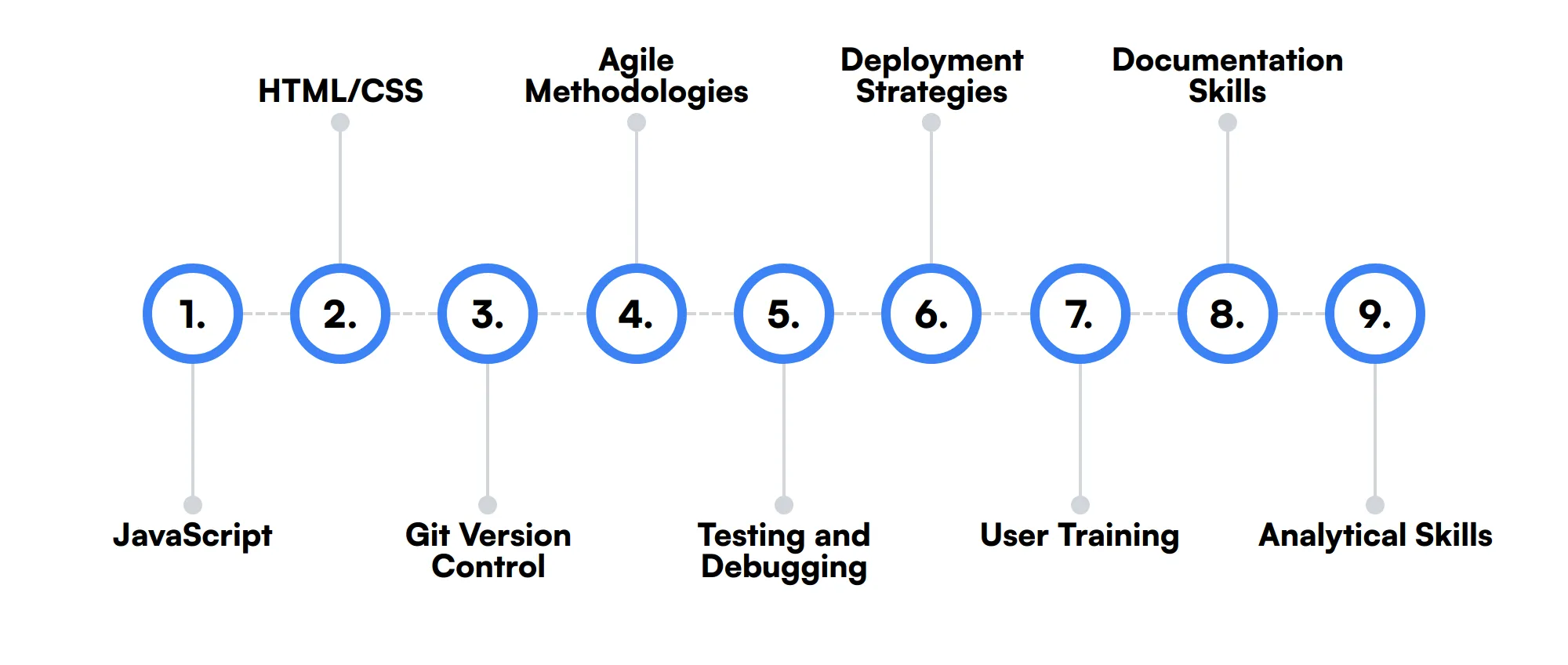
JavaScript
Knowledge of JavaScript is useful for Salesforce Developers to enhance and customize user interfaces, especially when working with Lightning Components and Visualforce pages.
HTML/CSS
Basic knowledge of HTML and CSS is beneficial for Salesforce Developers to create and modify Visualforce pages and Lightning components with custom styles and layouts.
Git Version Control
Proficiency in Git helps Salesforce Developers manage and track changes in their development projects, facilitating collaboration and version control in team environments.
Agile Methodologies
Familiarity with Agile practices supports Salesforce Developers in managing projects efficiently, adapting to changes, and delivering solutions iteratively.
Testing and Debugging
Salesforce Developers must be adept at testing and debugging to ensure the reliability and performance of applications. This includes unit testing in Apex and troubleshooting both server-side and client-side issues.
Deployment Strategies
Understanding deployment processes and tools like Salesforce DX or change sets is important for Salesforce Developers to manage the release of new features and updates without disrupting existing services.
User Training
Developers may also be involved in training end-users on new systems. Being able to instruct others on how to use the applications built on Salesforce can enhance user adoption and success.
Documentation Skills
Effective documentation is crucial for ongoing maintenance and future development. Salesforce Developers should be able to document their code and solutions clearly and comprehensively.
Analytical Skills
Being able to analyze requirements and transform them into robust solutions is key for Salesforce Developers. This involves critical thinking and problem-solving abilities.
How to assess Salesforce Developer skills and traits
Assessing the skills and traits of a Salesforce Developer can be a challenging task, given the diverse range of technical proficiencies required. From Apex Programming to Security Practices, a Salesforce Developer must be adept in various areas to effectively build and maintain Salesforce applications.
While resumes can highlight certifications and experience, they often fall short in demonstrating a candidate's true proficiency and fit for your specific needs. Skills-based hiring practices, such as talent assessments, provide a more reliable way to evaluate a candidate's competencies.
To ensure you are hiring the right talent, consider using specialized assessments. Adaface on-the-job skill tests can help you achieve a 2x improved quality of hires and an 85% reduction in screening time. These assessments are designed to evaluate key skills like Visualforce Pages, Lightning Components, SOQL/SOSL, and more, ensuring you find the best fit for your team.
Let’s look at how to assess Salesforce Developer skills with these 3 talent assessments.
Salesforce Developer Test
Our Salesforce Developer Test evaluates candidates on their proficiency in Salesforce development, including Apex programming, Visualforce pages, and Salesforce Lightning. This test is designed to determine a candidate's ability to effectively utilize the Salesforce platform and develop applications that align with customer needs.
The test assesses candidates on their knowledge of Apex Collections, Batch Apex, Visualforce Input Tags, and Visualforce Charts. It also evaluates their understanding of Workflow Rules and Actions, as well as Salesforce Functions and Integration capabilities.
Successful candidates demonstrate a strong ability to code in Apex and customize Salesforce environments. The test includes questions that gauge a developer's proficiency in creating and managing efficient, scalable Salesforce applications.
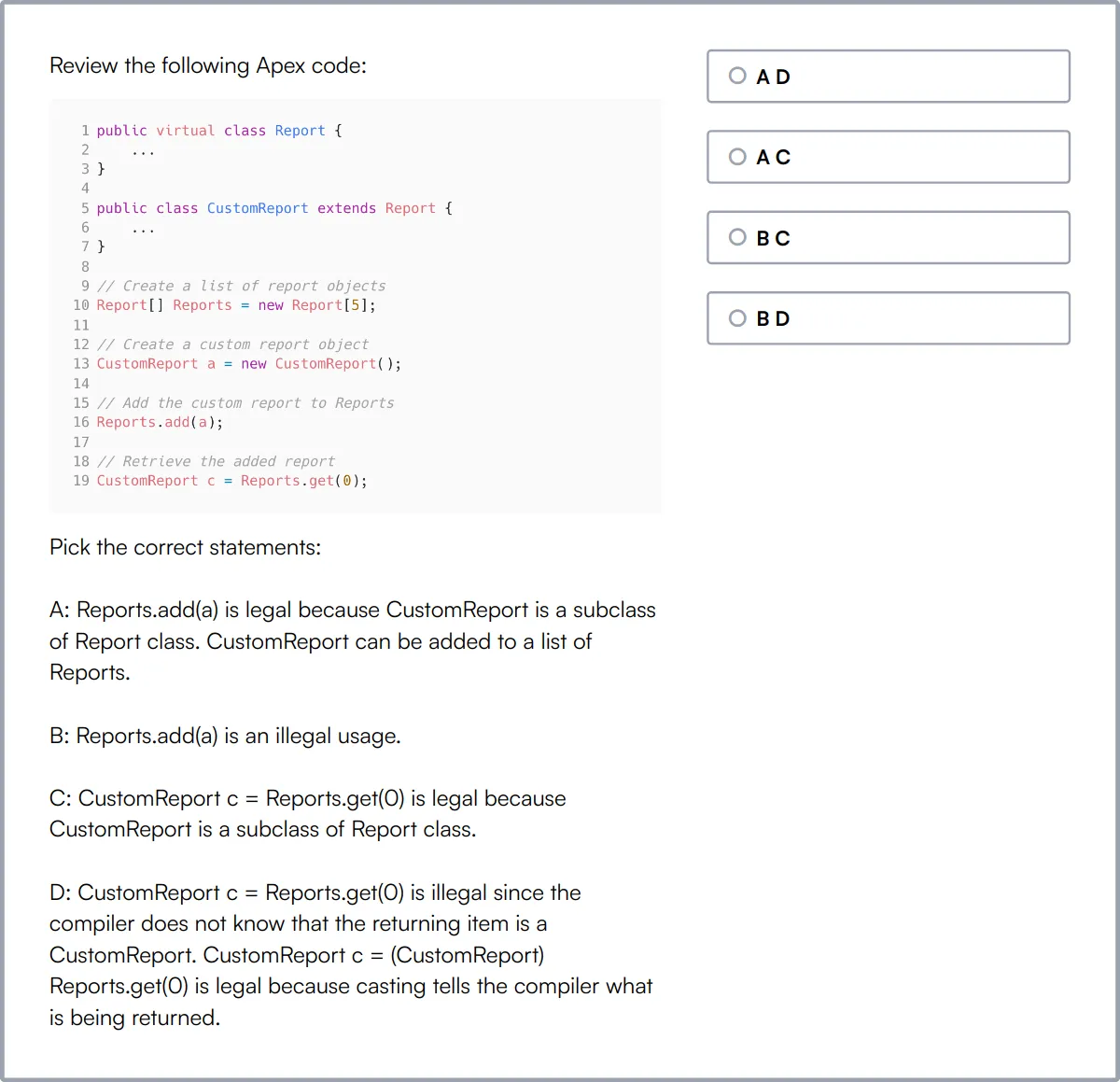
Data Modeling Skills Test
Our Data Modeling Skills Test assesses a candidate's expertise in data modeling and database design, including their ability to work with SQL, ER diagrams, and normalization processes. This test is crucial for evaluating a candidate's skill in structuring and managing efficient databases.
This test challenges candidates on their understanding of relational schema, data integrity, data mapping, and data transformation. It also evaluates their skills in data validation and the use of SQL for data manipulation.
High-scoring candidates will demonstrate a thorough understanding of data architecture and the ability to design databases that are both scalable and optimized for performance. The test includes a variety of scenarios to assess how well candidates can apply their knowledge in practical situations.
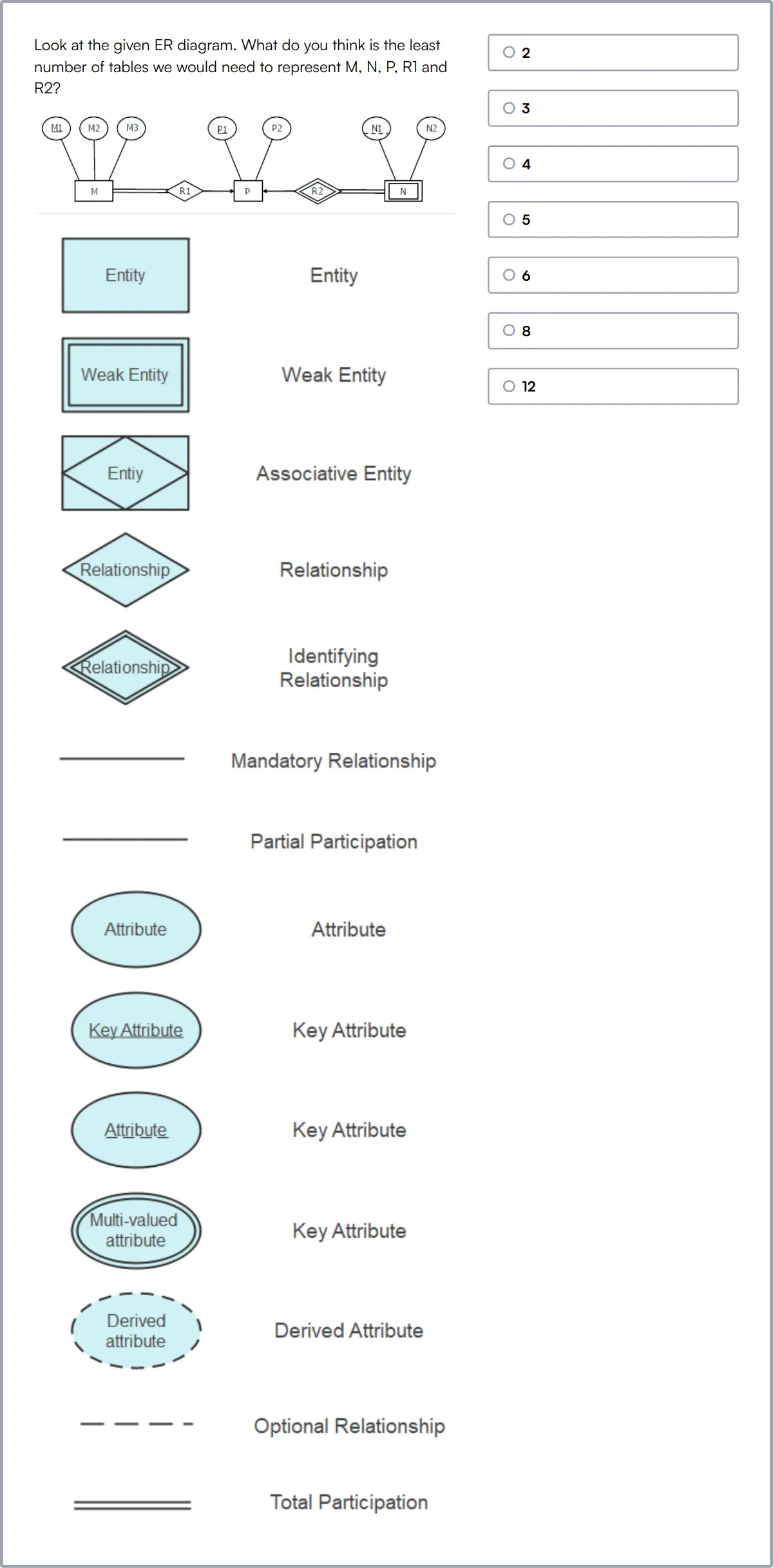
Cyber Security Assessment Test
Our Cyber Security Assessment Test evaluates candidates on their knowledge of cybersecurity, including network security, cyber attacks, and cryptography. The test is designed to identify candidates' abilities to secure systems and mitigate risks effectively.
The test covers a wide range of cybersecurity topics, such as detecting and defending against network attacks, implementing secure protocols like TLS and SSL, and understanding the principles of web and email security. It also assesses knowledge in data security practices like encryption and backups.
Candidates who perform well on this test are typically proficient in setting up defenses against common and emerging cyber threats. They understand how to conduct risk assessments and are capable of implementing robust cybersecurity measures to protect organizational data.
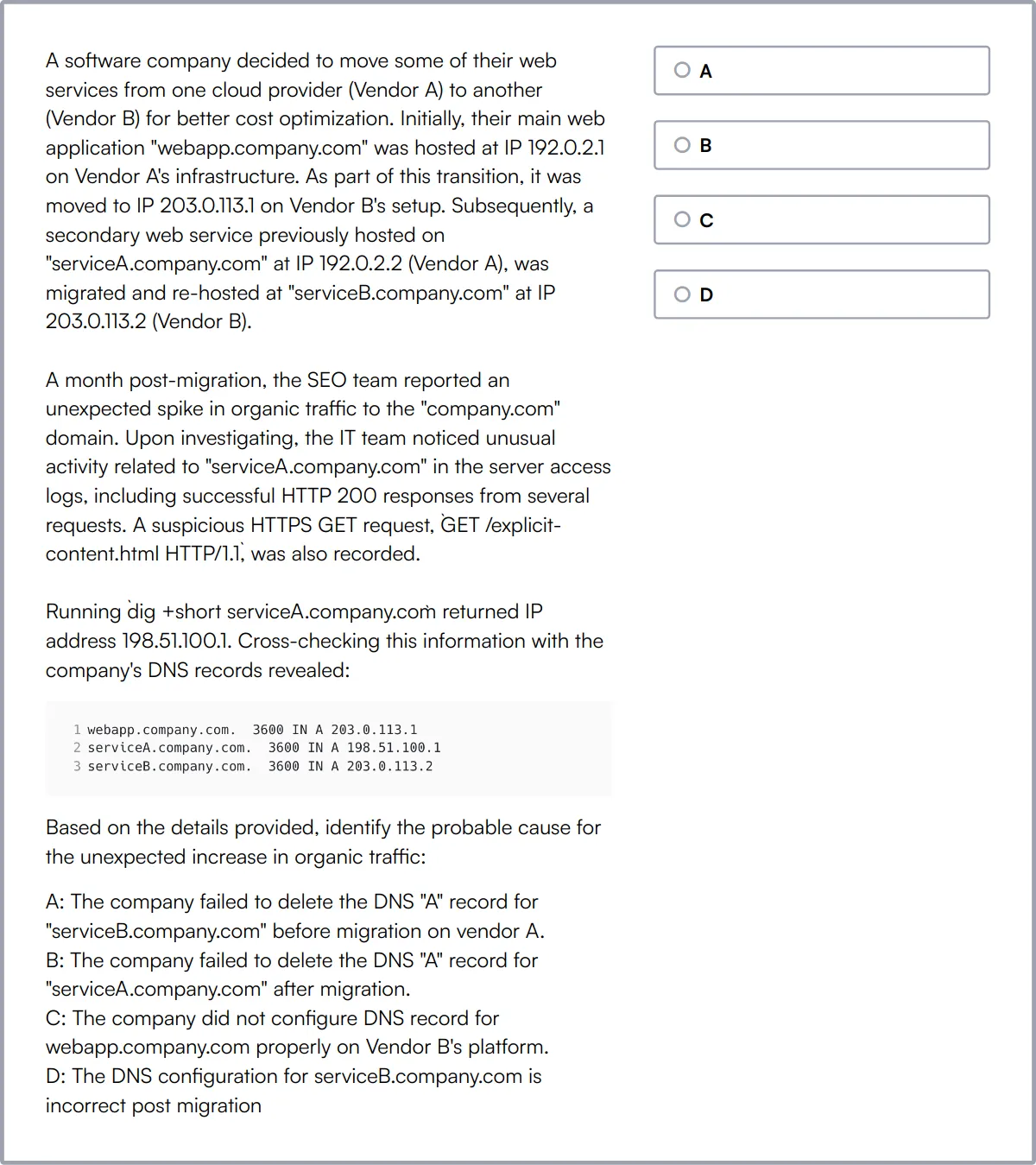
Summary: The 8 key Salesforce Developer skills and how to test for them
| Salesforce Developer skill | How to assess them |
|---|---|
| 1. Apex Programming | Evaluate proficiency in writing custom business logic and server-side code. |
| 2. Visualforce Pages | Assess ability to create custom user interfaces using Visualforce markup. |
| 3. Lightning Components | Check skills in building reusable components for modern web applications. |
| 4. SOQL/SOSL | Measure expertise in querying Salesforce data using SOQL and SOSL. |
| 5. Salesforce APIs | Determine knowledge of integrating Salesforce with external systems via APIs. |
| 6. Data Modeling | Evaluate capability in designing and managing Salesforce data structures. |
| 7. Process Automation | Assess proficiency in automating business processes using Salesforce tools. |
| 8. Security Practices | Check understanding of implementing security measures within Salesforce. |
Salesforce Developer Test
Salesforce Developer skills FAQs
What technical skills should a Salesforce Developer have?
A Salesforce Developer should be proficient in Apex programming, Visualforce, Lightning Components, and Salesforce APIs. Knowledge of SOQL/SOSL, data modeling, and process automation is also important.
How can recruiters assess a candidate's proficiency in Apex programming?
Recruiters can assess Apex programming skills through coding tests, reviewing past project contributions, or specific questions about Apex syntax, best practices, and real-world problem-solving scenarios.
What are some key non-technical skills for a Salesforce Developer?
Important non-technical skills include analytical abilities, documentation skills, user training capabilities, and familiarity with Agile methodologies. Effective communication and teamwork are also important.
Why is understanding Salesforce security practices important for developers?
Understanding security practices is key to ensuring that applications are secure and compliant with data protection regulations. Developers need to implement security at every level of application development.
How important is JavaScript and HTML/CSS knowledge for Salesforce Developers?
Knowledge of JavaScript and HTML/CSS is crucial for creating engaging and responsive user interfaces in Salesforce, especially when working with Lightning Components and Visualforce pages.
What should a Salesforce Developer know about deployment strategies?
A Salesforce Developer should understand various deployment strategies, including the use of change sets, Salesforce DX, and CI/CD pipelines, to manage and streamline the deployment process.
How can testing and debugging skills be evaluated during the hiring process?
Testing and debugging skills can be evaluated by discussing specific scenarios where the candidate has identified and resolved bugs, or through practical tests that involve writing test cases and debugging code.
What role does Git version control play in Salesforce development?
Git version control is important for managing code versions, collaborating with other developers, and maintaining a history of changes. Familiarity with Git can help ensure smooth development and deployment processes.

40 min skill tests.
No trick questions.
Accurate shortlisting.
We make it easy for you to find the best candidates in your pipeline with a 40 min skills test.
Try for freeRelated posts
Free resources



